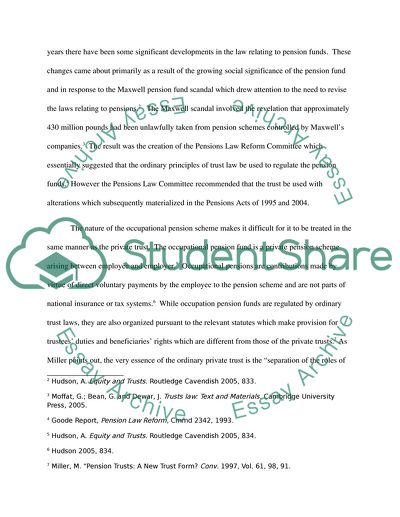Cite this document
(Current Law Regulating Pension Funds Research Paper, n.d.)
Current Law Regulating Pension Funds Research Paper. Retrieved from https://studentshare.org/finance-accounting/1731017-the-developing-law-in-relation-to-occupational-pension-trusts-reveals-the-inadequacies-of-trust-law-to-deal-with-the-realities-of-anything-other-than-private-trusts-discuss-in-relation-to-the-status-of-beneficiaries-in-occupations-pension-trusts
Current Law Regulating Pension Funds Research Paper. Retrieved from https://studentshare.org/finance-accounting/1731017-the-developing-law-in-relation-to-occupational-pension-trusts-reveals-the-inadequacies-of-trust-law-to-deal-with-the-realities-of-anything-other-than-private-trusts-discuss-in-relation-to-the-status-of-beneficiaries-in-occupations-pension-trusts
(Current Law Regulating Pension Funds Research Paper)
Current Law Regulating Pension Funds Research Paper. https://studentshare.org/finance-accounting/1731017-the-developing-law-in-relation-to-occupational-pension-trusts-reveals-the-inadequacies-of-trust-law-to-deal-with-the-realities-of-anything-other-than-private-trusts-discuss-in-relation-to-the-status-of-beneficiaries-in-occupations-pension-trusts.
Current Law Regulating Pension Funds Research Paper. https://studentshare.org/finance-accounting/1731017-the-developing-law-in-relation-to-occupational-pension-trusts-reveals-the-inadequacies-of-trust-law-to-deal-with-the-realities-of-anything-other-than-private-trusts-discuss-in-relation-to-the-status-of-beneficiaries-in-occupations-pension-trusts.
“Current Law Regulating Pension Funds Research Paper”, n.d. https://studentshare.org/finance-accounting/1731017-the-developing-law-in-relation-to-occupational-pension-trusts-reveals-the-inadequacies-of-trust-law-to-deal-with-the-realities-of-anything-other-than-private-trusts-discuss-in-relation-to-the-status-of-beneficiaries-in-occupations-pension-trusts.


